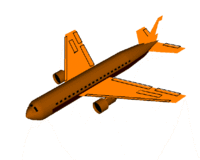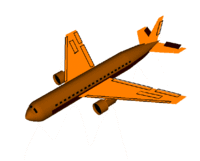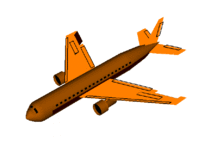Helm
| Helm | |
|---|---|
| Category: | Functional |
| Function: | controls a ship or station |
| Fits small grid | |
| Mass: | 264.0 kg |
| PCU: | 50 |
| Size: | 3x4x3 |
| Time to Build: | 20 sec |
| Fits large grid | |
| Mass: | 264.0 kg |
| PCU: | 50 |
| Size: | 1x1x1 |
| Time to Build: | 20 sec |
| Data Controls: | [edit] [purge] (?) |
The Helm is an alternative Cockpit block that you can only build if you have purchased the Warfare 2 Pack DLC.
Offering the same functionality, this block costs less PCU than other cockpits, but it's also less sturdy. Instead of sitting, like in a Control Station, you stand in front of the Helm, but it counts as being seated for a jump. Visually, this block has a HOTAS-inspired controller (hands on throttle-and-stick) and two configurable LCDs.
Cockpit Control
A cockpit block is essential to steer spaceships or rovers, and can secondarily be used as control station for a stationary base. Its third function is providing Life Support for the player.
- Main article: Category:Cockpits
The multiple variants of cockpits function the same, they only differ in proportions, mass, visibility, material cost, conveyor ports, and grid size.
Control Panel Screen
You can allow or disallow yourself to use certain cockpit functions. For example, a straight-boring drill rig does not want to worry about drift caused by the pilot touching the mouse—so switch off manual gyro control. Or, if the wheels of a monorail tram are controlled by a timer block, you switch off manual wheel control.
- Control Thrusters -- (For grids with thrusters only) Whether the pilot's directional inputs activate thrusters.
- Control Wheels -- (For wheeled grids only) Whether the pilot's directional inputs propel and turn wheels.
- Control Gyros -- (For grids with gyroscopes only) Whether moving the mouse controls turning (pitch, roll, and yaw).
- Handbrake -- (For wheeled vehicles only) Enables you to add the Handbrake action to the Toolbar slot to brake quickly.
- Park -- Whether pressing P key unlocks/locks connectors and landing gears. See Cockpit Controls for how to configure this for your grid's blocks!
- Inertia Dampeners -- (For grids with thrusters only) Whether pressing Z key toggles assistive Inertial Dampers.
- Show Horizon and Altitude -- See details about "Altimeter and Attitude" below.
- Main Cockpit -- If the grid has multiple cockpits, specify whether this is the main cockpit. Other cockpits on the same grid will not be able to steer or jump the ship.
- Enable target locking -- See Target Locking to learn how to make turrets lock on to targets.
- Set Up Action -- See details how to configure "Cockpit Alarms and Countermeasures" below.
- LCD Panel -- See LCD Surface Options for how to run scripts or display text or images on the built-in LCD panels of the cockpit. For example to display a preflight checklist.
How to Use Cockpit Controls
To sit in a cockpit, face the cockpit and press F key to enter.
- To control functional blocks while seated in a ship or station, press K key to open the Control Panel.
- If you build several cockpits on a grid, set one as the main cockpit here.
- Press G key to assign important control panel actions to your Tool Bar.
- Press P key to (un)lock Landing Gears and Connectors. To configure this behaviour, see Cockpit Controls.
- Press Y key to switch on/off all Batteries and Reactors.
- Press L key to switch on/off all Spotlights.
Press F key again to exit the cockpit.
How to Steer
How you place the cockpit on a mobile grid defines its forward direction.
- To move forward / backwards / left / right, press the WASD keys
- To move up and down, press SPACE key and C key
- To yaw and pitch, move the mouse or use the arrow keys (requires Gyroscope)
- To roll, press Q key and E key (requires Gyroscope)
- To toggle Inertial Dampers, press Z key
| Yaw | Pitch | Roll |
|---|---|---|

|

|

|
Tip: Different points of view help you when docking. To toggle between first and third person, press V key. Hold ALT key and move the mouse to change the viewing angle in third person!
Note: If you see a message "A connected ship has taken control"[1], another player is using the cockpit of a ship that is docked to yours.
How to Use Ship Tools
Does your grid have Block Weapons or Block Tools? Set up their controls before leaving the dry dock!
- Aim at the cockpit and press F key to sit in the cockpit.
- Press G key to open the cockpit’s Toolbar config.
- Drag the icons for each type of Block Weapon or Block Tool to the Toolbar for quick access.
- Press 1 key to 9 key to select that tool or weapon, and then
 -click and
-click and  -click to use it.
-click to use it.
Additionally assign other block actions to toolbar slots, such as AI turret range increase/decrease, thruster overrides, or parachute opening.
How to Switch Weapons
First, see Block Weapons for how to set up weapons in the toolbar.
- To switch between sets of equipped weapons, use
 -click.
-click. - To cycles between single-gun and all-gun modes within the same type (all Rocket Launchers->all gatlings->all guns, for example), use single-
 -click
-click - To switch to the next weapon of the same type that has ammo loaded, use double-
 -click.
-click.
How to View Altimeter and Attitude
While seated in the cockpit of a mobile grid in natural gravity, a cockpit indicates attitude (horizon) and altitude (height) on your HUD. If it doesn't, enable the Show Horizon and Altitude toggle in the cockpit's Control Panel.
- The artificial horizon near your crosshairs shows your pitch and roll, angles which are often hard to tell without a reference point.
- Your altitude in metres above ground is displayed in the middle of the HUD, as a number below the crosshairs. Knowing your height above the terrain is relevant when landing and flying to avoid collisions.
Note that the Cockpit HUD does not display your height above non-terrain structures (such as stations or landing pads), nor your height above sea level. You can't use the altitude to know how deep into the atmosphere you are and how effective your Atmospheric Thrusters will be.
Tip: You can also display artificial horizon, altitude, attitude, and angular momentum, on any of the built-in LCDs in your cockpit.
How to Set Up Alarms and Countermeasures
The cockpit can trigger an automatic reaction when it detects a hostile target lock on the grid.
For example, you can configure it to switch on defensive AI turrets, or to play an audible alarm, or to switch on red lights, or to release a merge block that drops decoys, ... Similarly, configure it to switch off your custom “Red Alert” as soon as you break out of target lock.
This is how:
Click Set up Actions to select from the available actions:
- The action in the first slot triggers when you are targeted.
- The action in the second slot triggers when you have broken out of target lock.
If you want to trigger more than one action, select a Timer Block as action, and set up the desired toggle actions inside the Timer block.
Do cockpits maintain Life Support?
Cockpits offer passive life-support functionality to seated players:
- Being seated recharges your suit power. An unpowered seat maintains suit power indefinitely but doesn't recharge it.
- Sitting in an open cockpit in an airtight room, or in a closed cockpit conveyored to a source of oxygen, recharges your suit oxygen while seated.
- Open cockpits in low oxygen environments do not recharge your oxygen.
Trivia
Instead of having a standard keyboard layout, the key labels on the Helm keyboard spell out sentences when read from left to right:
Gallery
Construction
Helms can be built on large and small grids for the same amount of components. On large grid, the block needs 1x1x1 blocks space to place, but it is physically much narrower than other cockpits and leaves space for players to walk by. Helms have mount points on the bottom, on the forward facing side where the console is, and on the sides.
Recipe
| Component | Large Ship/Station Required | Large Ship/Station Optional | Small Ship Required | Small Ship Optional |
|---|---|---|---|---|
| 1 | — | 1 | — | |
| 10 | 10 | 10 | 10 | |
| 2 | — | 2 | — | |
| 15 | 5 | 15 | 5 | |
| 20 | — | 20 | — | |

